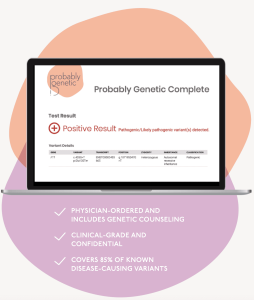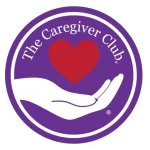Welcome to The Caregiver Club
We are a registered 501 (c) (3) organization that supports the overall well-being of dementia caregivers. We are 100% caregiver-focused, offering four complimentary programs (two national and two St. Louis-based) specifically designed for dementia caregivers. Please visit our homepage to learn more.
Who is Probably Genetic?
Probably Genetic is a group of patients, geneticists, and engineers that seek to make genetic testing more accessible to rare disease patients. Their team partners with patient advocacy groups and biotech companies to launch no-cost genetic testing programs because they’ve witnessed firsthand what patients endure.

Probably Genetic allows patients or their caregivers to access a self-initiated genetic testing option from the comfort of their homes. Many people cannot access the genetic testing necessary for a diagnosis without outrageous costs or medical professionals being unwilling to order testing. It can also be difficult to find the right specialist to be knowledgeable about genetic testing options for diagnostic purposes. That is why the opportunity for no-cost testing offered by Probably Genetic can be of such value to undiagnosed patients.
About Probably Genetic’s Program
Probably Genetic has recently partnered with The Bluefield Project to Cure FTD to launch a genetic testing program specifically for neurodegenerative/dementia conditions. The program was designed with a highly sensitive approach, and was built in collaboration with the community of affected individuals and their care partners.
If deemed eligible for testing, patients will go through a pre-test genetic counseling session, where the process and implications will be fully explained and participants can explore what genetic testing means for them. Those who opt to receive testing will receive a C9 expansion assay and whole genome sequencing (WGS), with results shared via a post-test genetic counseling session to explain any findings. All pathogenic, likely pathogenic, and variants of uncertain significance associated with the patient’s reported symptoms are reported, even if the mutations found aren’t related to neurodegenerative conditions. The entire process is at no cost to participants, with both affected individuals and caregivers of affected loved ones encouraged to submit to the program.
How Do Patients Apply?
Eligibility is determined by completing a brief, patient and family-friendly online symptom checker. If an individual qualifies for no-cost testing based on their submission, they are notified via email, and a testing kit is sent to their home address. The test only requires a saliva sample, which is returned to the lab using a prepaid shipping box for convenience and to avoid exposure during a time the vulnerable are limiting social interactions due to the pandemic. Caregivers are allowed and encouraged to submit and collect samples for their loved ones.
What Happens to the Results?
Probably Genetic is the custodian of all patient data submitted through their programs, which means identifiable patient information is never shared with third parties without consent. They follow strict HIPAA guidelines and their entire testing pipeline is CLIA and CAP accredited.
Any data or learnings from the program shared with any third party are completely de-identified, meaning that it is impossible to identify the original source of the submission. Patients can access all their information via a unique patient portal, where they can also opt for their sequencing results to be given to their physicians. Results are only shared with physicians if patients explicitly request for this to happen.
Is This a Clinical Trial?
The no-cost testing program is not a clinical trial, as no therapies or interventions are being tested and no research is being conducted. However, de-identified information generated by the programs can help advocacy groups and biotech companies better understand the patient experience for those living with rare and ultra-rare conditions. Examples include insights on the average wait for a diagnosis or the average symptom profile for a given condition. Thus, by participating in this program, patients can further rare disease knowledge in addition to potentially discovering the cause of their symptoms.
Cheyanne, Probably Genetic’s Community Manager and a rare disease patient herself, notes, “Receiving a confirmed diagnosis has been an immense help and has altered the entire trajectory of my medical care. Everything we do at Probably Genetic is in the hope of offering that opportunity to someone else.”
Determine Your Eligibility

Complete the Probably Genetic Symptom Checker for Dementia Conditions by clicking here. Probably Genetic encourages you to visit the webpage for additional information on the program.
Author Bio
Cheyanne is a rare disease patient, as well as the Community Manager for Probably
Genetic. Her role involves handling all patient communications and advocacy group
outreach.

